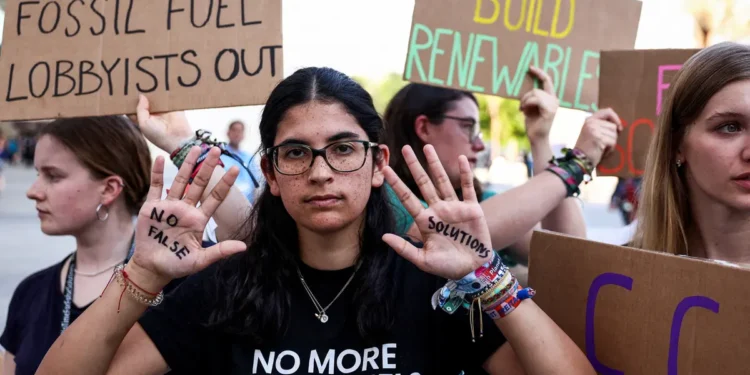As Cop28 unfolds in Dubai, a concerning revelation has come to light: more than 160 representatives with a history of climate denialism and obstructing climate action have been granted access to the UN climate talks. This revelation, brought to the forefront by transparency watchdog Corporate Accountability, underscores the influence of industry trade groups, think tanks, and public relations agencies with a track record of misleading the public.
The data, derived from official UN delegate lists, exposes that these entities, known for obstructing fossil fuel regulations, have been granted access to the international negotiations. This access is comparable or even greater than that given to Indigenous communities, human rights groups, and climate justice organizations.
At least 166 climate deniers and fossil fuel public relations professionals are reported to be present at Cop28, with the actual number likely higher as the analysis focused on prominent bodies. The timing of this revelation is critical, occurring at the end of a record-breaking year for high temperatures, with climate scientists warning of the urgent need to phase out fossil fuels to avert a climate catastrophe.
Oil and gas influence in Dubai is unprecedented, with over 2,400 industry-affiliated lobbyists registered at Cop28—four times the number at the previous summit in Sharm el-Sheikh. This staggering presence raises concerns about the impact of fossil fuel interests on global climate discussions.
“It’s obscene that climate denying organizations and fossil fuel companies’ PR agencies are welcome in these negotiations to spin, lie, and distort,” remarks David Tong, Global Industry Campaign Manager at Oil Change International. The sheer number of industry lobbyists raises questions about their role in influencing policy decisions.
Among the notable attendees is the American Petroleum Institute (API), the largest fossil fuel trade group, known for blocking legislation to limit greenhouse gas emissions. API’s attendance as an accredited observer delegation raises eyebrows, given its history of misleading the public on climate change. The API has been linked to astroturfing campaigns and funding climate denial organizations.
The Competitive Enterprise Institute (CEI), a US libertarian think tank, is also present at Cop28. The CEI, known for its critical stance on climate science, has called the IPCC’s final report a “far-left manifesto.” Myron Ebell, a senior fellow at CEI and a key figure in the US withdrawal from the Paris Agreement, has been accredited at multiple previous COPs.
While some argue that these entities deserve a seat at the table to contribute to discussions, others stress the need for a conflict of interest policy similar to that of the World Health Organization, which prohibits tobacco companies and lobbyists from attending its summits.
As Cop28 unfolds, the juxtaposition of climate advocates and climate skeptics in the same space raises critical questions about the influence of vested interests in shaping the global response to the climate crisis. The ongoing negotiations will determine the path forward, and the world watches as decisions are made that will impact the future of our planet.
















